On the long commute home, Andrea Becerra often gets held up. Long tailbacks in the Venezuelan capital can quickly be aggravated by protesters angry about pensions or security. But this week there was a different kind of delay: dozens of illegally parked cars jammed the traffic outside an electronics shop. Inside, people were buying knockdown goods as if their lives depended on it.
"Living here is like a cartoon," Becerra says. "Most of us can't find milk to drink, let alone to produce, and the president's best plan is to lower the prices of TVs."
She was referring to president Nicolás Maduro's recent moves to get shopkeepers to slash their prices. Maduro has spoken of jailing retailers, criticising the "speculation and usury" that he blames for Venezuela's economic woes.
But concerns are mounting that his actions are just treating the symptoms, not the causes of Venezuela's sudden financial lurch, and that although it might give his citizens a nice cheap early Christmas, the new year hangover threatens to be painful.
"It's a slap in the face to be told this is socialism and to see the government hand out electronics while most of us struggle to find food. There is no long-term plan," said Becerra.
Venezuela's economic wobble stems from strict currency and price controls imposed by the former president Hugo Chávez. Despite years of high oil prices, the distortions that these have caused in the economy have led to shortages, difficulties for local industries that are not oil-related and a flourishing black market laced with corruption.
The tell-tale signs of distress are multiplying. Queues outside grocery stores proliferate. Absurdly, the shops lack local staples – sugar, milk, flour – but are well stocked with subsidised imports such as single-malt whisky and Italian panettone. The black market rate for dollars has soared to 10 times the official rate. Inflation has rocketed to 54%, an all-time high. Capital continues to flee the country. More and more Venezuelans are watching their salary and life savings eroded. The head of the IMF, Christine Lagarde, warned last month that Venezuela was undergoing economic stress and would have to make some difficult policy decisions soon because it was running down its currency reserves.
"This is a balance-of-payments crisis in slow motion," said Alejandro Grisanti, a Barclays economist. "It's impossible for hard currency to flow to the productive sector of the economy. He added that most went on dummy companies and state-subsidised imports.
President Maduro has blamed the country's economic disaster on "economic warfare" waged by an opposition seeking to destabilise his government. For now, his populist move to bring prices down has found favour. For many people, buying a refrigerator or a wide-screen TV was a distant dream that Maduro has now made possible.
"This was long overdue," said Ivonne Mendoza, 37, a teacher. "Importers get cheap dollars but charge as if they didn't. I don't get it, but I also don't get why after 10 years of abuse the government kept giving them money."
For Maduro, the decision to increase controls, which comes a month before municipal elections that could amount to a referendum on his presidency, is a counter-offensive to his enemies' attempts to oust him. Maduro has insisted he will remain in power despite the efforts of a "parasitic bourgeoisie" to bleed the country dry.
According to some analysts, these price-busting efforts might help Maduro politically but will do little to solve the economy's structural problems.
"These have been politically motivated moves. [Among supporters] the common perception has been that Maduro is finally governing. That somehow, he is punishing the evil speculators and accompanying the people in their plight," said Luís Vicente León, a pollster and director of Datanalisis. "But the effects for the economy, come January, will be dire. No one will restock inventories."
One liquor-shop owner who preferred to be named simply as David explained the problem for businesspeople, retailers, importers – anyone who is uncertain whether they will be able to get dollars at the cheap official rate from the state Cadivi agency, or the prohibitively costly black market rate.
"If you bring in a bottle of Grey Goose vodka at the official rate you can sell the cheapest vodka in the world, but if you are having to pay black market rate you get the most expensive," David said.
"I buy from distributors who haven't gotten [central bank] dollars in four years. They are in debt with their providers and have logically lost their line of credit." A bottle of high-end vodka in his shop sells for approximately $222 (£134) at the official rate, or $21 on the black market. The same bottle sells for $28 in the US.
Maduro has acknowledged that there is corruption behind the currency controls. He has declared war on the parallel market, which includes shutting down 70 web pages that report the daily rates, but has failed to outline any plan to lift the controls.
On Thursday, Maduro announced the arrest of more than 100 "bourgeois" businessmen in the crackdown on alleged price-gouging. "They are barbaric, these capitalist parasites!" Maduro said in a televised speech. "We have more than 100 of the bourgeoisie behind bars at the moment."
"It's time to deepen the offensive, go to the bone in this economic war," he said.
Maduro said the forced price cuts should lead to negative inflation of 15% in November and 50% in December – forecasts that brought immediate mockery from critics on Twitter.
A decade of ever-increasing margins between the two currencies has meant that those with access to state dollars have made large fortunes. For many this has discouraged local production and has bred rampant corruption, from importers who overprice, to government officials getting a cut of the approved quota, and even one unnamed motorcar racer who got more than $60m for "sports activities" abroad.
"Cadivi is the best business in town. I have made up to $35,000 a month on a $250,000 transaction", says a small-time black market dealer of the margins in his line of work. "People – and companies – here make a lot of money but they want to take it out [to offshore accounts].If the government doesn't approve your quota, you go to the black market. You lose some money but at least you got it out."
For the pollster Luís Vicente León, a terminal crisis or a social explosion is unlikely as long as oil prices remain high, but the hard-hit economy will continue to keep Becerra and many more up at night. "We might see an economy of war with few shops opened and more people buying food off trucks instead of stores."
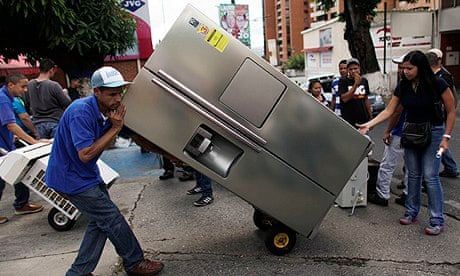

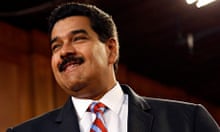

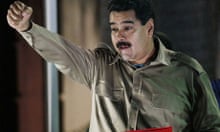
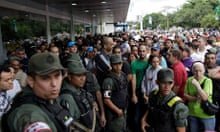

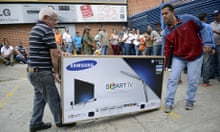
Comments (…)
Sign in or create your Guardian account to join the discussion